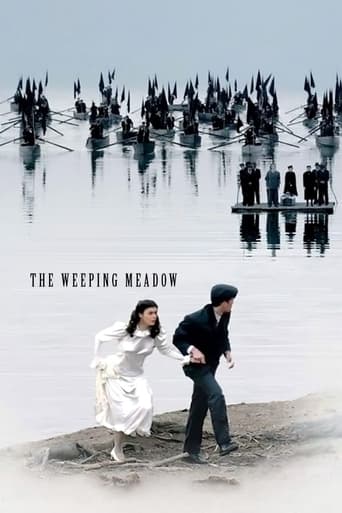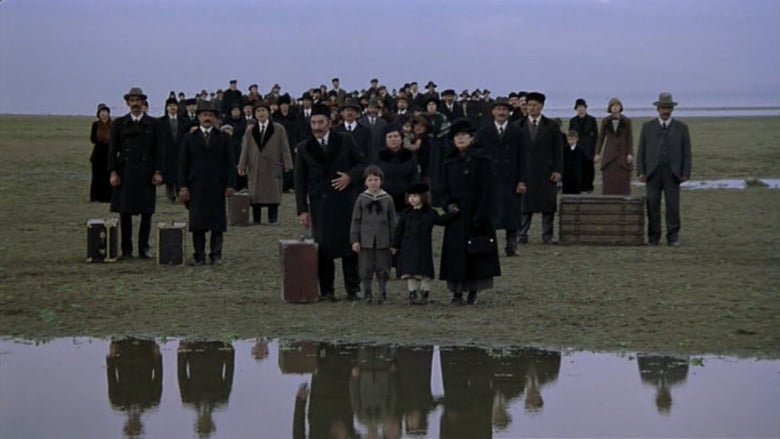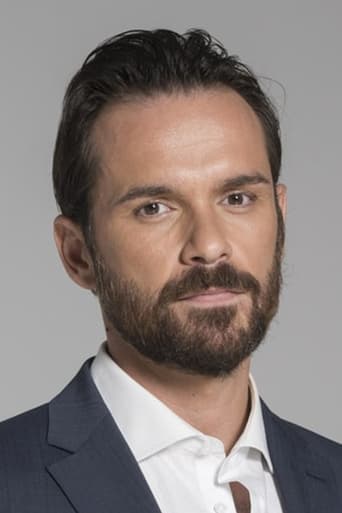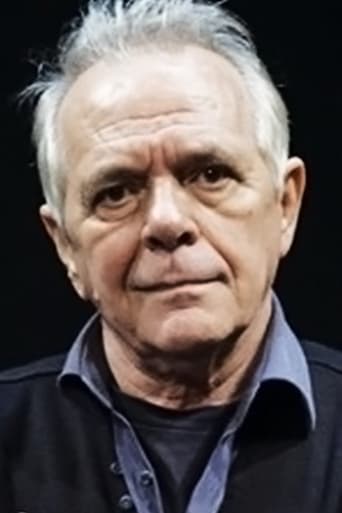

The Weeping Meadow (2004)
The first part of an incomplete trilogy telling the story of the greek people. The film begins in 1919, with Greek immigrants from Odessa arriving near Thessaloniki. Led by the charismatic Spyros, they establish a new settlement in the delta of a river. The youngest of the settlers are Spyros' son Alexis and an orphan from Odessa, Eleni. A strong, almost incestuous affection develops between the teenagers, resulting in twins who are given to a foster family. Also standing in the way of love is Spyros, determined to take his foster daughter as his wife. The lovers then decide to flee the village, persecuted by their father, leading a life of exile. As Alexis joins a group of musicians planning to go to the United States, Eleni regains custody of the twins. Angelopoulos, as in previous films, looks at the sacrifice of civilians confronted by the workers' demonstrations of 1935, the rule of Metaxas' fascist junta and forced emigration to America, and finally the civil war of 1944-1949.
Watch Trailer
Cast
Reviews
Good story, Not enough for a whole film
A film with more than the usual spoiler issues. Talking about it in any detail feels akin to handing you a gift-wrapped present and saying, "I hope you like it -- It's a thriller about a diabolical secret experiment."
After playing with our expectations, this turns out to be a very different sort of film.
I think this is a new genre that they're all sort of working their way through it and haven't got all the kinks worked out yet but it's a genre that works for me.
Most of the story's most significant events are entirely unseen; Angelopoulos seems to be less interested in events than in their aftermath. What we see is not conflict, not love, and not loss, but rather the effects of these things on the people in the story. It's almost like watching only the scenes that would be cut out of a Hollywood epic; all the "fat" that would normally be trimmed to create a lean story is on display here without any of what would be considered the "meat." The result is something less thrilling but altogether more resonant. Things take a long time to occur not just within scenes but within the viewer's mind as well. I didn't start to really feel for any of these people until about an hour into the film, but at that point I suddenly found myself completely hooked.I was particularly amazed by my reaction to Eleni, played by Alexandra Aidini. For much of the movie she is given little to do but cry and her performance is seemingly rather weak. But by the end of the film I felt deeply connected with her plight and I felt tied to every emotional upheaval she encountered. Her performance likewise became extremely powerful, and unless Angelopoulos shot this film in sequence I have to assume it was engineered that way somehow. Perhaps it's simply that Angelopoulos spends so much time distancing the audience from the drama that when he finally goes in for a close-up (figuratively -- in literal terms there's nothing tighter than a medium shot here) the emotion just smacks you in the face.Beyond the characters, the film is amazing simply for its visual audacity, the way every long shot is planned to the minutest detail a la Bela Tarr, and they only become more staggering as time wears on. The story also feels ancient; despite taking place (mostly) in the 1940's, you sense a profound connection to the heritage of its characters and their history, such that moments which in other cases might seem like melodramatic clichés (the unraveling of Eleni's scarf, for instance) instead feel like deeply rooted folk symbolism.
Orphan Eleni was looked after by Alexis' family. As she grown up, she involved in an embarrassing situation. Although she was in love with Alexis, his father tried to separate them. Even his father wanted to marry her. The young pair had nothing to do but escape. However what happened next were not what they expected.One of exciting scenes was that a crowd of people danced in a worn-out place. Although life was hard for them, they still knew how to enjoy themselves. That is good. Optimism is the best medicine for difficult position.I thought it would be a hard-to-know film. After watching it, I found I was wrong. Director Theo Angelopoulos taught me a good lesson about Greek history with elegant way. The lively music should not be overlooked. It is the first one of trilogy. I am looking forward to watching remaining two films though they have not been finished yet.A great Greek drama. 8/10
Had I known to what I was submitting myself, I would have fled from the theater. The film is dreadful, in the literal sense of the word. Despite striking images, intriguing locales, and a subject matter that might have been fascinating, the film is dead.I was unfamiliar with this period of Greek history, and prepared to experience a great film. The filmmakers's hand is heavy. it is not enough to see a train going by; we must watch it from afar, we must watch it car by car, we must see the smoke, we must see it slow down, and we must see it stop. The director's approach is didactic. Likewise, the characters that he creates never develop, they never change. They are so stereotypic that we wonder, are they meant to be Everyman? Everygirl? Everyoldmusician? Is there some point to this allegory? It is the most pretentious film that I have seen in a long while.
I can pretend no knowledge of cinematography or Mr. Angelopoulos. But I know Greece and I love her people. In July my 14 year old son and I traveled to Cappadocia, Turkey in search of some remains of the neighborhood where his great grandfather Iordanis lived until the great exodus of Anatolian Greeks in 1923. Reading the summary of the film (refugees from Odessa) I thought that perhaps I might learn something more about the forced migrations of modern Greeks. If I did not have a home in Rhodes, had I not been to Greece 28 times in as many years, were I not familiar with dozens of islands and cities in Greece and if I had never enjoyed the friendship of these ebullient, life-intoxicated people, I might have believed that this lamentation had something to do with modern Greece. As a professor at a New Jersey State college, let me assure you that I am familiar with the history of the period covered in the film. Indeed, my wife's uncle was murdered by the communists during the communist grab for power. My mother-in-law lived through the Italian invasion and German occupation...barely. These characters on the screen speak Greek, they listen to Greek music but who are they? No, they are not even vaguely Greek. Of course they are not people at all but simply allegories. They are that which the artist invents when life does not entirely fit or is inadequate to his perception of how it was or should have been. All represent some aspect of post WWI Greece that greater outside forces consigned to a fate they didn't deserve. As we joked in the late 70's in America: "The Revolution didn't happen." For an ideologue/artist, this is no joke. It's in fact grounds to put us through two and a half hours of torment. And it's all because the various Powers (Eleni's soliloquy of "guards" in different colored uniforms) didn't allow the generation after the "aristocrats" of 1919 (Spyros) to follow the call of peace and freedom (the music of Nikos and his fellow musicians, i.e., the Movement, the Cause). This dark, surreal revisionism smears the true and heroic efforts of the Greek people to sustain their lust for life through the tragedies of the 20th century, to achieve more than any of their Balkan neighbors, to have become so politically evolved and globally integrated.


